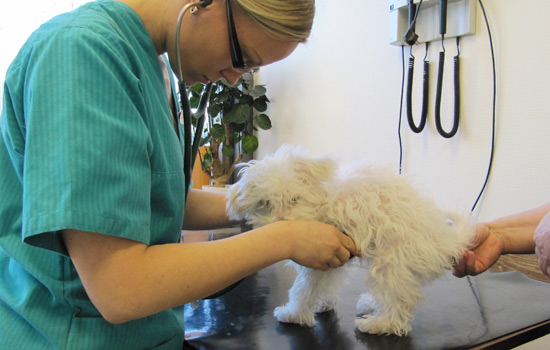Avoinna arkisin ma-to 8-20, pe 8-19.
La päivystys ajanvarauksella klo 9-17.
Heart diseases are very common in cats and dogs. In dogs the most common ailment is symptomatic heart failure resulting from degenerating heart valve/valves. This ailment is common especially in middle-aged or old individuals of small breeds (for example: cavalier King Charles Spaniel, Dachshund, Miniature Schnauzer). One may suspect a valve problem when you can hear a cardiac murmur in an aging dog. Heart muscle diseases or cardiomyopathies are common in big dogs (Irish wolfhound, Boxer, Doberman), but cocker spaniels also present cases of heart muscle illness.
Congenital heart ailments are discovered every now and then. The most common heart disease in cats is the so-called hypertrophic cardiomyopathy or illness resulting from the thickening of the heart muscle. In some cats it is congenital (Maine Coon cats), in old cats it may be hyperthyroidism and in some cats the cause is unknown.
Heart problem symptoms are, among others, lowered resistance in physical activity, cough (dogs), exceptionally strong panting, apathy, stomach swelling and weight loss. Sometimes the symptoms of symptomatic heart failure begin little by little, and the owner thinks that the fatigue and apathy are due to old age. Because of this it is recommended that aging animals be taken to a health inspection annually, so that possible heart murmurs or arrhythmia may be detected. If during a vaccination or other visits the veterinarian, when listening to the heart detects an arrhythmia or a strengthening of the murmurs, or in a cat murmurs are identified for the first time, then there is a reason to book an appointment for a heart examination.
When an animal comes in for a heart examination, it first undergoes a general examination, where its general condition is looked at, the colour of its mucosa is seen and its heart is listened to. When listening to the heart, if a murmur is heard, its strength and location (front chamber valves area or pulmonary artery valve area) are ascertained. Any changes in the rhythm of the heart are also established. The heart beat is measured and the pulse taken. An X-ray of the thoracic cavity is taken to look for accumulation of liquids in the lungs. An X-ray can also determine whether there has been any change in the size of the heart (due to a valve disorder the left atrium often becomes bigger).

An electrocardiograph (ECG) is used to ascertain arrhythmia, which are usually present in heart muscle diseases. It is also used to see if there is a lack of oxygen in the heart muscle (blood circulation disturbances in the heart muscle) and whether there is any enlargement of the left or right side of the heart. The electrocardiograph is very important for the diagnosis of heart muscle disease (cardiomyopathy). With the ultrasound the size of the atriums and chambers and the thickness of the heart muscle are measured. With these measurements it is possible to determine the “ability to contract” of the heart, which gives a picture of its pumping power. Often blood samples will be taken from the heart patient in order to clarify among other things the functioning of its liver and kidneys. If it is suspected that an old cat has heart muscle disease, the thyroid hormone level must always be assessed.
Animal medication is decided based on the examination results. A patient suffering from a mild valve defect will usually be alright for a long time only on blood pressure medicine, but for instance in cases of cardiomyopathy in Dobermans, the care is begun immediately and aggressively with various different medicines. In cats hyperthyroidism leading to heart muscle disease is cared for primarily with a medicine which depresses the activity of the thyroid gland. Prior to a heart exam it is advisable to make the animal fast for 12 hours mainly because blood samples may be taken. Other instructions are given when booking an appointment. If the animal has been examined and treated at another clinic/s, it is advisable to take along any X-rays, electrocardiograms and information on medication.